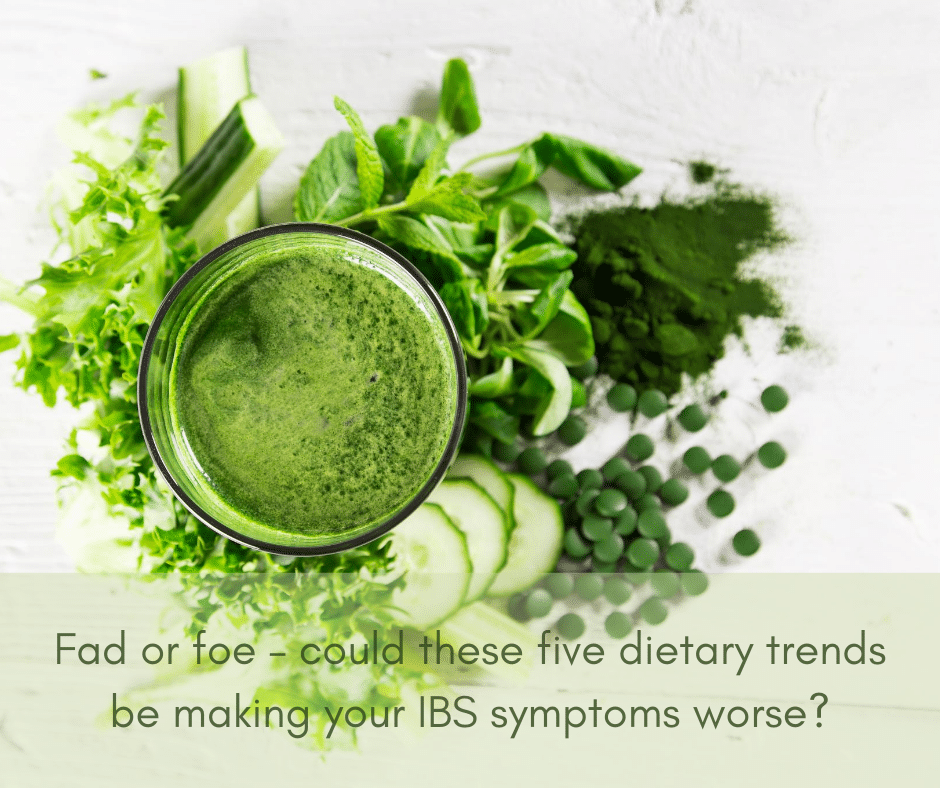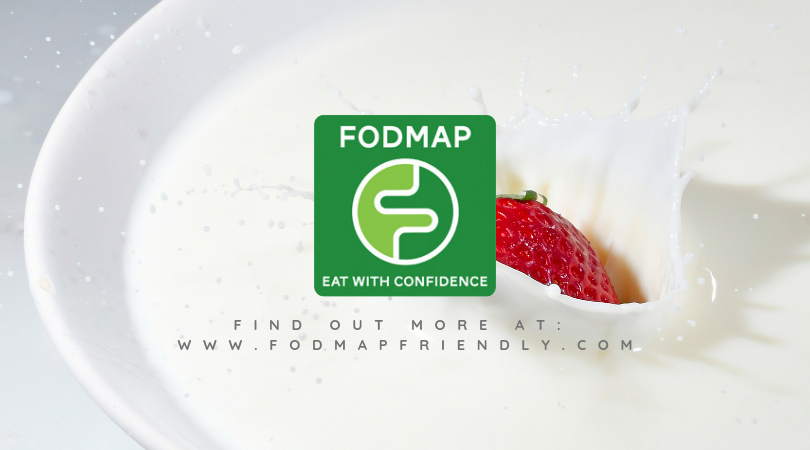Fad or foe – could these five dietary trends be making your IBS symptoms worse?
Posted on September 02, 2020

Each year brings with it a new set of dietary trends that make their way into the media. Recently, we’ve seen cauliflower whizzed into pizza, celery juiced, and intermittent fasting become permanently popular. Although these trends may be in vogue, they could be making your IBS symptoms worse by promoting the consumption of large amounts of high FODMAP foods.
Today on the blog, we’ll be giving a run-down of five popular dietary trends running their mill by examining the trend, any scientific backing and why those with IBS might want to tread carefully, as to not exacerbate your symptoms.
Celery Juice
Celery juice has become ‘all the rage’ – with purported benefits ranging from being a liver detoxifier to lowering cholesterol. Although it has received media hype, there is little scientific evidence to suggest that drinking celery juice is healthier than eating a whole celery. It is important to remember that celery juice is 95% water, and celery isn’t ‘magical’ compared to other vegetables.
The takeaway: Eating a variety of plant foods is a fantastic habit, but juicing plants can actually reduce much of the fibre content which is essential to feed our gut microbes. Additionally, celery is high in mannitol – a sugar alcohol (the ‘p’ in FODMAP) that those with IBS aim to avoid. Keep eating your vegetables but refer to the FODMAP Friendly app to see which ones may trigger symptoms in specific quantities.

Intermittent fasting
Intermittent fasting goes under many names and variations, but at its core involves periods of fasting followed by ‘eating windows’. For example, someone may fast for 16 hours and then eat their meals within a five-hour window.
The takeaway: There is currently no evidence to support fasting for IBS symptom improvement. In fact, fasting may exacerbate IBS symptoms as it prompts people to eat large meals after a long fasting break, which can activate our stomach stretch sensors and cause painful bloating & gas. You may not be able to fit in the fibre needed to help ‘move things along’ your digestive system by restricting your eating window either. Instead of intermittent fasting, you could focus on other ‘first line’ approaches to IBS symptom relief such as maintaining adequate fibre intake and eating moderate rather than large meals.
Cauliflower pizza & rice
In recent years, we’ve seen cauliflower whizzed into rice and baked into pizza. This dietary trend coincides with the interest in low carbohydrate & paleo-style diets, as cauliflower is seen as a low-carb substitute for traditional rice in these settings. It’s important to note that cauliflower and rice are in completely different food groups – cauliflower is a vegetable and rice is a grain. Whole grains, such as brown rice are important sources of many nutrients, including dietary fibre, B vitamins and minerals such as zinc, iron and magnesium.
The takeaway: cauliflower is a vegetable high in mannitol – a sugar alcohol (the ‘p’ in FODMAP) that those with IBS may experience symptoms from eating. Additionally, although these vegetable rice substitutes may be low in carbohydrates, they are also lower in the fibre and nutrient goodness found in traditional grains. There is no need to substitute rice for cauliflower rice.

Juice fasts
Proponents of juice fasts often recommend drinking solely juice for several days to months. Doing this is said to reverse chronic disease, ‘detoxify’ the body and kick start weight loss. Juicing machines remove the pulp, or fibrous part of fresh fruit and vegetables. This means you can squeeze more fresh fruit & vegetables into your diet, because the fibre isn’t there to satiate you.
The takeaway: it takes many different fruits and vegetables to make up a juice – this is why you can easily drink ‘eight oranges’ in a glass of orange juice but would struggle to do the same if you ate eight whole oranges. Eating large amounts of fruits and vegetables at once can cause a ‘FODMAP stacking’ effect – as many common juicing fruits/vegetables are high in fructose, fructans and/or sorbitol. Also, insoluble fibre (found in the peel of such foods) is very important in promoting bowel regularity. Eat your five plus a day, but don’t feel the need to go and buy a fancy juicing machine.

Gut powders or elixirs
As the interest in gut health continues to rise, the surge in ‘healing’ gut powders on the market is increasing too. Often, these powders claim to be helpful with a range of health ailments – from bloating to bowel irregularities, boundless energy to restful sleep.
The takeaway: Such powders often contain ingredients high in FODMAPs, such as inulin and prebiotics. Although prebiotics are great for gut health as they feed our good bacteria that reside in our gut, such concentrated doses are often high FODMAP and may in fact exacerbate symptoms such as bloating, cramps and/or wind. Look after your gut, but don’t go and spend hundreds of dollars on gut powders. Eating a range of fruits and vegetables that don’t exacerbate symptoms and having adequate fibre are two behaviours your gut will thank you for.
With all of this in mind, what does a healthy diet actually look like?
Dietary trends are just that – trendy. Although some trends have more scientific merit than others, none are likely to ‘heal’ your gut or ‘reverse’ your symptoms. The secret is that there is no secret – the message of aiming for a well-balanced diet has been there all along. Eating a range of plant foods – fruits, vegetables, grains, legumes as well as dairy products (lactose free if lactose is an issue) and meats will put you in good stead towards a healthy diet. It is important to work with a dietitian who will help you decipher fad from fiction and provide personalised advice for achieving a healthy diet that helps rather than exacerbates your IBS symptoms.
Written by: Charlotte Barber (Student Nutritionist)
Reviewed by: Sotiria Karatsas (Accredited Practicing Dietitian)








